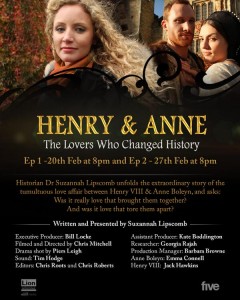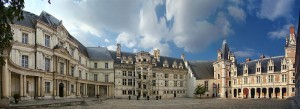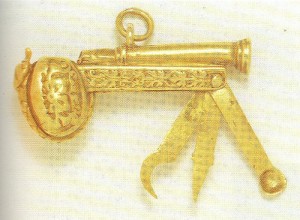 I know that many of you were unable to watch last night’s programme, Henry and Anne: The Lovers Who Changed History, so I took notes for you. My TV did go wrong a couple of times, so I missed a few minutes – sorry!
I know that many of you were unable to watch last night’s programme, Henry and Anne: The Lovers Who Changed History, so I took notes for you. My TV did go wrong a couple of times, so I missed a few minutes – sorry!
The programme opened with Anne Boleyn preparing herself for her execution on 19th May 1536. Dr Suzannah Lipscomb spoke of how Henry VIII was King of England and the country had experienced political and religious turmoil for the last decade. Anne was walking to the scaffold to face her final destiny. Henry had shown her one last act of mercy, to be beheaded by a skilled swordsman from Calais, rather than be beheaded by axe. Henry and Anne’s love affair had had a huge impact on the country, dividing England from Europe and bringing in a new religion. Suzannah explained that she would be retracing Anne and Henry’s footsteps to see what brought them together and then what tore them apart.
Suzannah’s journey began in the Kent countryside, where she’d gone in search of Anne Boleyn. She spoke of how Anne’s badge had been a falcon, a symbol of purity, chastity and grace. It’s a popular myth that Anne was a social upstart, that her family were of lowly origins, but this is far from the truth (as I keep saying, by the way!). Suzannah visited Hever Castle, Anne’s childhood home, where Thomas Boleyn and his wife, Elizabeth, raised their children. Out of the three surviving children, Mary was the eldest and George was the youngest. George was a great companion to the bright Anne. Thomas Boleyn was a member of the King’s council and Henry’s ambassador to France. The Boleyns were a wealthy, privileged family, and Anne was well-educated. Traditionally, she’s seen as a free spirit, sparky, intelligent and fun-loving, but this is based on rumour and speculation. We know little about her personality because we don’t have any diaries, just a few letters. But when you go to Hever Castle the veil between past and present seems to become thin.
We do have a few telling pieces of evidence. Suzannah looked at the beautiful illuminated Book of Hours at Hever, which belonged to Anne. Anne held that book, it was a treasured possession, and it shows the importance of faith at that time, how religion marked out people’s days. We have this picture of Anne the vixen, a worldly woman, but this Book of Hours reminds us that she was pious. Anne wrote an inscription in it, on a page which appears to show the Last Judgement. She wrote “Le Temps Viendra, Je Anne Boleyn”, “The time will come, I Anne Boleyn”. We don’t know what she meant by those words but they seem powerful and prophetic. Although Anne could be referring to the Day of Judgement, which Tudor people believed would come soon, there may be a more earthly explanation: did Anne Boleyn believe that she was destined for greatness?
Anne’s destiny lay with a married man: Henry VIII, the King. We think we know Henry but the picture we have of him is often based on the Henry of the last years of his reign, when he was ruthless and obese. The young Henry was noted for his good looks. He had auburn hair and was 6’2″ tall in a time when the average height for a man was 5’7 and a half. He was good at sport, his archery surpassed that of the archers of his guard, he was a talented jouster and horseman, and he was good at tennis. The Venetian Ambassador described him as having “a round face so very beautiful that it would become a pretty woman”. He was well-loved, considered to be kind, he was affable, gracious, gentle and very charismatic. He had few flaws but he was tormented by a failure that would bring him to Anne and a relationship which would change England for ever.

On 18th February 1516, the day that Catherine of Aragon gave birth to Mary, Henry had been married to Catherine for six years. He did not have a male heir and the Tudor dynasty seemed fragile. Henry had not been born to be king, his older brother, Arthur, had died at the age of 15 and so Henry became king on the death of his father, Henry VII. Within months of his accession he married Catherine of Aragon, his brother’s widow, and they were crowned together. But with marriage came huge pressure, the couple needed to produce an heir and a spare. They were married for over 24 years, and most of those years had been happy, but the marriage had been blighted by a series of miscarriages and stillbirths. A son, Henry, died at just fifty-two days old, and Mary was their only surviving child. There was seen to be little value in a female heir who’d marry a foreign prince and put England under a foreign power, so Henry’s overriding obsession was to have a son.
Henry VIII believed that he was anointed by God and therefore felt punished by God for marrying his brother’s widow. Leviticus 18:16 and 20:21 were both Bible verses against marrying your brother’s widow and 20:21 said that the new union would be “childless”. The theological experts Henry consulted advised him that “childless” meant no sons.
The programme then switched to Anne Boleyn. The teenage Anne had spent her formative years in the Netherlands and then at the French Court. This was a defining influence and a formative period for her. Suzannah visited the Château Royal de Blois where Francis I of France held his court. Anne became a lady to the cultured and pious Queen Claude, Francis’ wife. The French court was the most fashionable court in Europe and Blois had spectacular architecture. Claude was a patron of the Arts and Francis was a huge fan of the Renaissance. He was responsible for bringing Leonard da Vinci to France and Anne may well have met him. It was an exciting place to be. Anne became like a native born French woman.

Suzannah spoke to expert Cedric Michon who explained that Anne would have learned French and she most probably acted as an interpreter at the Field of Cloth of Gold in 1520. She received a European education and also saw what it meant to be queen. Claude had seven children in eight years and was extremely pious, so her court was not a hotbed of promiscuity, as is often thought.
The first surviving letter written by Anne is to her father and it shows her aspirations to be part of the English court and to serve the Queen. Anne is seen as either a sexual predator or a chaste woman, yet her French education and time abroad prepared her to be a much more complex character. She was transformed into a desirable young woman by her time in Europe, and she was shaped by many influences. We tend to see her as black or white: pious or worldly, sexual or chaste, but she was much more complex than that.
By her early 20s, Anne was back in London. Suzannah visited Hampton Court Palace and explained how Anne joined Catherine of Aragon’s household as one of her ladies, becoming a companion to the Queen. She explained that there were around 1200 people at court, 200 of whom were ladies. The Tudor court was a heady mix of politics and theatre. Thomas Betteridge explained that it was religious and serious, but also fun and awash with desire, love and sex. It was full of young people with too much time on their hands. The game of courtly love was a big tradition at court. Henry VIII was the leading courtly lover and there was competition for the role of Henry’s leading lady. Did Anne aspire to this?
Henry did have mistress, particularly when Catherine was pregnant, and this was expected and accepted. In 1519, Elizabeth Blount gave birth to Henry’s son, Henry Fitzroy, and this indicated to Henry that it was not his fault that Catherine had not given him a son. In 1522, when Anne was new at court, Henry was involved with Anne’s sister, Mary. We don’t know much about Mary or the relationship, and perhaps this fleeting royal affection was a warning sign to Anne.
By March 1526, Henry had been married for 17 years and still did not have a son. His relationship with Anne Boleyn is one of the most famous love stories but we do not know how it began, although it is likely that he noticed Anne in courtly entertainment. Soon Henry was writing love letters to her and giving her gifts. Suzannah visited the Victoria and Albert Museum to see a gold whistle pendant which Henry is said to have given Anne. As well as being a whistle, it had a scoop for ear wax and tooth picks. Henry was saying to Anne “If you whistle, I will come”. Perhaps this was just another gift to a courtly love mistress, but soon the relationship would be deeper.

Much is made of the dark political forces and what is lost is that their relationship was a real passionate love affair between two individuals. Henry’s love letters to Anne survive in the Vatican Archives and the sweetest of them all is in French and Henry tells Anne that his heart belongs to her alone and he hopes that his body will also. Henry ends it by writing his initials separated by the French “autre ne cherche” (is not looking for any other), and then writing Anne’s initials in a love heart in the centre of his signature. It’s just like a schoolboy doodling on a book. We don’t know exactly when the letters were written and we don’t have Anne’s responses, but we can tell from these letters that their love was getting stronger. The lack of responses from Anne means that we have to fill in the gaps, and some people have seen Anne as manipulating Henry and playing a game, but both of them probably wanted to do what was right when it came to holding off on consummating their relationship. There could only be a legitimate heir if Anne was Henry’s wife. They were passionately in love but they wanted to wait and do it right.
The stakes were high. Thomas More once said that politics was “kings’ games, as it were, stage plays, and for the more part played upon scaffolds, in which poor men be but the lookers-on”, so Anne was risking everything. It was tough on Henry too, though, as he had to think the unthinkable: divorce Catherine and marry Anne. No king had ever divorced a queen and Henry’s quest for a divorce became known as the King’s Great Matter. A play at court made Henry’s feelings clear. The play was called “The Play of the Weather” and in it Jupiter wanted to replace an old leaky moon with a new tighter one. It was a statement of his contempt for Catherine, whose only crime was not having a son. However, Henry would underestimate how difficult it would be to end his marriage.
By December 1529, the Pope had blocked Henry’s divorce. Henry was used to getting his own way and so needed to find a solution. It was actually Anne who came up with the solution. Anne gave Henry a copy of William Tyndale’s “Obedience of a Christian Man”. In it, Tyndale argued that the supreme authority was scripture, not the Pope, and that it was shameful for princes to be under the Pope’s authority. He wrote that princes/kings were judges over all and that there was no judge over them. Henry read it and declared “This is a book for me and all kings to read”. This book gave him the solution. He didn’t need permission from Rome and this idea that he was first under God played to his ego.
Henry and Anne’s love affair had a profound impact. Henry broke ties with Rome and set about creating a Church of England, with him as its supreme head. He was risking war and needed a powerful ally so in October 1532 he and Anne went to France to seek approval for their relationship from Francis I. They got it. This had cleared the path to marriage and Henry and Anne became lovers, either in Calais or shortly after their return to England.
Suzannah has always believed that they were passionately in love. If you have any doubt over their feelings then just take a look at the Flemish Book of Hours in the British Library. It gives a glimpse into their relationship and was obviously never meant to be read by anyone but them. On one page, Henry wrote to Anne “If you remember my love in your prayers as strongly as I adore you, I shall hardly be forgotten, for I am yours. Henry R. forever.” Anne chose the page carefully for her reply. On the page with an illumination of the Annunciation (the Angel Gabriel telling the Virgin Mary that she was pregnant), Anne wrote the couplet “By daily proof you shall me find To be to you both loving and kind.” Anne was saying that she was the woman to provide Henry with a son.
Now it was time to make their union official. Suzannah went to Whitehall. Unfortunately the grand Tudor buildings were mostly destroyed in a fire, although there is a bit left in the Cabinet Office, and this is a crying shame because much of Anne and Henry’s story was played out at Whitehall, including the pinnacle of their relationship: their marriage. They would have been overjoyed on that day in January 1533. Anne was pregnant and this time they were sure it would be a boy.
Henry had defied a Pope, redefined his kingdom, and it seemed that love had conquered all.
The second and final part will be on Channel 5 on 27th February at 8pm.
You can find out more about the programme at www.channel5.com/shows/henry-anne-the-lovers-who-changed-history/articles/about-the-show
You can follow Dr Suzannah Lipscomb on Twitter at https://twitter.com/sixteenthCgirl
This article is a rundown of the programme so the content is the views of Suzannah Lipscomb and the other experts mentioned. I’m not able to say which bits are direct quotes from Suzannah, but obviously it follows her voice-over closely.
I’d love to hear what you all thought of the programme. I agree with Suzannah that Anne and Henry had a very real and passionate love affair, and it was good to hear from a historian with a balanced view of both Henry and Anne. It is easy to think of Henry as the brute he was in later years, and think “what did she see in him?”, and also not appreciate how complex a character Anne was. I had an email from Emma Connell, the actress who played Anne, and in it she said that she felt that the programme “shows Anne in a beautiful light rather than a witch and manipulator”, I have to agree. What do you think?